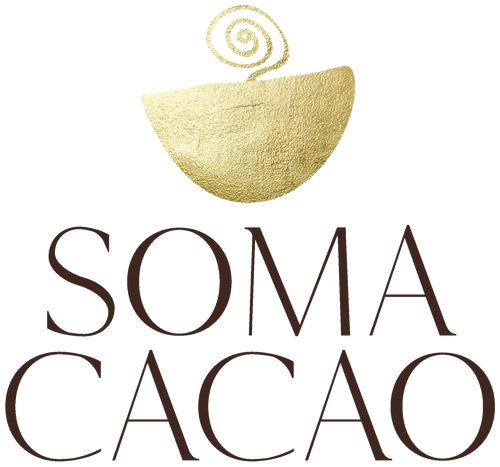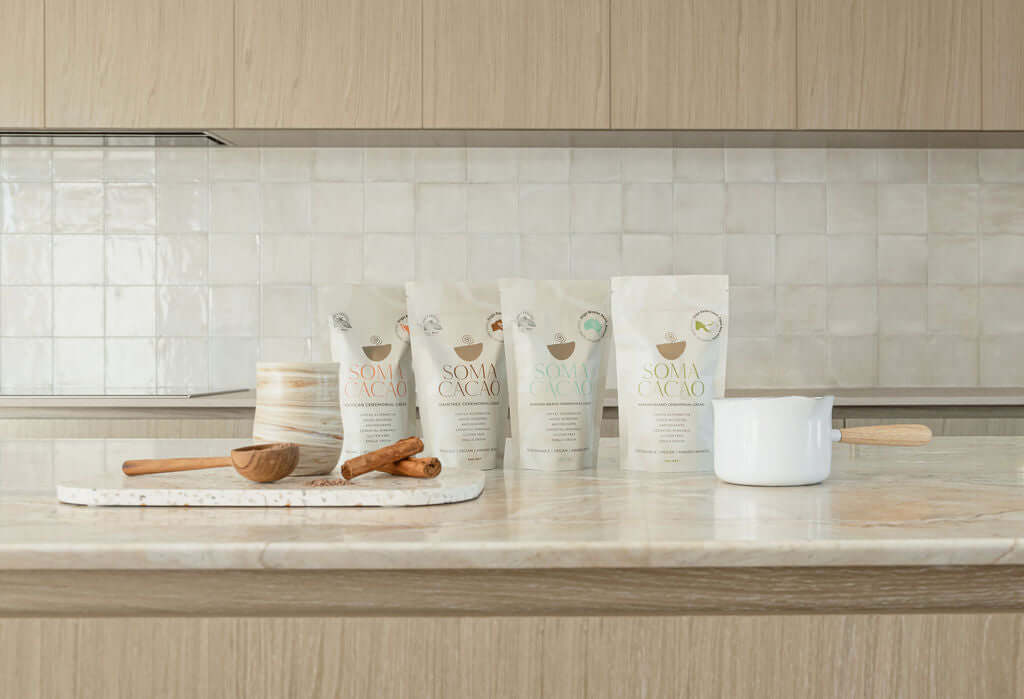Will ceremonial cacao make me fat?

This post is dedicated to my Mum.
My mum recently horrified me by bringing to my attention a potentially highly damaging misconception about cacao: “I love your cacao Rose, but I don’t drink it because it’s fattening!’
Mum is referring to the fact that cacao is relatively high in fat when compared to coffee, which has zero fat.
But what does this actually mean for our health? Low fat diets became popular in the 1980s & 90s, but our knowledge of nutrition has come a loooong way since then. The ‘low-fat’ craze changed the way Americans eat, and yet they got fatter than ever.
I’ve attempted to break this all down into some take-home facts, primarily in the hope that my Mum will join Dad in a morning cacao and switch out at least one cup of coffee per day for cacao - at least for the sake of her nerves.
1. The correlation between fat content and getting fat is no longer a thing.
More and more research suggests the assumption that eating fat will make us fat is dangerously misguided. “There is one thing we know about fats,” Aaron Carroll, a professor of pediatrics at the Indiana University School of Medicine, writes in his new book, “The Bad Food Bible: How and Why to Eat Sinfully.” “Fat consumption does not cause weight gain. To the contrary, it might actually help us shed a few pounds.”
Numerous studies have revealed that people who restrict their intake of fatty foods do not lose weight or gain any health benefits. By contrast, high fat, low carb dieters tend to lose weight and experience other health benefits as well. Another study published in the journal The Lancet compared more than 135,000 people on low-fat and low-carb diets across 18 countries. The researchers found that low-fat diets were more likely to be linked with death from all causes, and found a higher likelihood of heart attacks and heart disease as well. People on low-carb diets, high-fat diets, on the other hand, had significantly lower risk of both of these outcomes.
2. A regular cup of cacao is equivalent in calories to a small latte.
If fat content isn’t your concern but you’re counting your calories, read on. If you’re a latte, flat white or cappuccino drinker, your calorie intake per cup will be virtually the same as the amount of calories in a daily dose of cacao, prepared with a dash of oat milk and a teaspoon or two of honey.
“Fat consumption does not cause weight gain. To the contrary it might actually help us shed a few pounds.”

3. Cacao is an appetite suppressant.
These days I have a cup of cacao early in the morning, and then I don’t get hungry again until about midday. Turns out there’s science behind this too, for example:
-
A systematic review and meta-analysis published in the journal "Nutrients" in 2019 analyzed the effects of cacao consumption on appetite, food intake, and body weight. The review included 12 randomized controlled trials and found that cacao consumption was associated with reduced appetite and food intake, as well as decreased body weight and body mass index (BMI) in some studies.
-
There’s a hormone our body produces called ghrelin, which increases our appetite. A recent study done in the Netherlands showed that dark chocolate and, of course, pure cacao, lowered ghrelin levels thus reducing our appetite. Cacao also produces serotonin, which is considered a powerful appetite suppressant.
-
Another study published in the journal "Appetite" in 2014 investigated the effects of consuming a cacao drink on appetite and food intake in healthy adults. The study found that consuming the cacao drink reduced hunger and increased fullness compared to a placebo drink. The authors suggested that the appetite-suppressing effect of cacao may be due to its effect on gut hormones that regulate appetite.
-
One study published in the journal "Nutrition" in 2013 investigated the effects of dark chocolate consumption on appetite and energy intake. The study found that consuming dark chocolate with a high percentage of cacao (85%) significantly reduced hunger and increased satiety compared to consuming milk chocolate. The authors suggested that the appetite-suppressing effect of dark chocolate may be due to the presence of bioactive compounds such as flavanols, which are abundant in cacao.
-
A study published in the journal "Nutrition Research" in 2011 found that consuming dark chocolate with a high percentage of cacao (74%) significantly reduced hunger and increased satiety in women, compared to consuming milk chocolate. The authors suggested that the appetite-suppressing effects of dark chocolate may be due to its rich content of fiber and polyphenols, including flavanols and catechins.
-
Another study published in the "International Journal of Obesity" in 2013 investigated the effects of consuming a cacao-containing beverage on appetite and food intake in overweight and obese adults. The study found that consuming the cacao-containing beverage reduced appetite and increased satiety, leading to a decrease in overall food intake.
4. Cacao supports weight-loss.
In addition to its role as an appetite suppressant, cacao is also thought to have anti-obesity properties. This is because it can inhibit digestive enzymes, which is important for fat loss. Likewise, a study analysing the effects of cocoa beans on rats led to their rapid and significant weight loss, and resulted in an improvement of cholestrol levels. Cocoa procyanidins have been found to improve insulin sensitivity in skeletal muscle, which improves glucose metabolism and reduces the risk of metabolic disease.
5. Cacao is long-lasting, non-addictive, and fulfilling, so it is unlikely you would want or need to match your cacao intake with your old coffee intake cup for cup.
When I used to drink coffee I’d finish a cup and pretty much be ready for my next cup immediately. Cacao is totally different. After my morning cacao I feel satisfied. In fact I have no interest even in food for another few hours, and while I occasionally have an afternoon cup of cacao it is never out of a feeling of ‘need’, but rather a feeling of wanting to take some time out to be with me. I don’t have any science for this one - I invite you to test this one out for yourself ;)
6. Cacao helps us work out.
Cacao is an epic pre-workout all natural supplement the boosts our endurance, improves performance, and helps us recover. Cacao’s unique stimulant, theobromine, dilates our blood vessels, helping blood flow more freely throughout the body. This helps relax smooth muscle tissue, resulting in a quicker recovery and happier muscles. The half-life of theobromine is different to caffeine too - where caffeine tends to result in an intense buzz then a crash, cacao gives a more gentle, pleasant stimulation, that lasts longer, and doesn’t seem to drop us down in the same way as coffee.
Cacao’s mineral content also makes it an ideal workout companion. Minerals are key for even the most basic of cellular functions, and are required even moreso during intense exercises. Cacao boasts high quantities of iron, zinc and magnesium all of which play essential roles in basic metabolic function, and are known ingredients in pre-workout supplements. Head on over to our benefits of cacao page for a more in depth discussion of the science behind cacao.
Some studies:
- One study published in the "Journal of the International Society of Sports Nutrition" in 2015 found that consuming a cacao drink 90 minutes before exercise improved endurance performance and increased fat oxidation in trained cyclists.
- Another study published in the "Journal of Strength and Conditioning Research" in 2017 found that consuming a cacao extract supplement for six weeks improved muscle function and reduced oxidative stress in recreational athletes.
- Caffeine, which is naturally present in cocoa, is a well-known stimulant that can enhance exercise performance by reducing perceived exertion and increasing endurance.
-
Additionally, the flavanols in cocoa may have anti-inflammatory and antioxidant effects that could potentially aid in exercise recovery and reduce muscle soreness.
So…. will cacao make me fat?
As with everything, moderation is key. However, given cacao’s appetite suppressing, metabolism boosting, workout supporting properties, coupled with the redundancy of the dated assertion that eating fat makes us fat, we should be even less concerned about cacao making us fat than our morning latte.
- Tags: Health


































